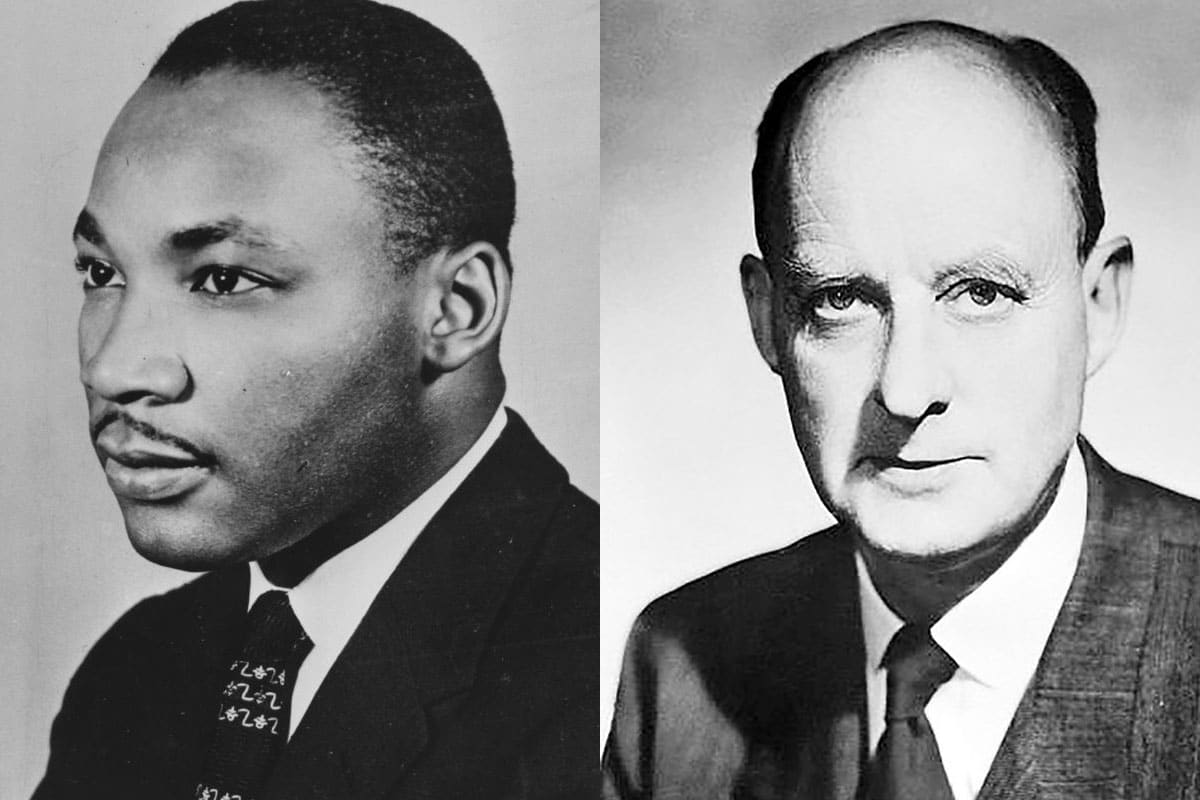 Martin Luther King, Jr. (1929 – 1968), circa 1960. (Photo by FPG/Archive Photos/Getty Images); Reinhold Niebuhr, 1958 (Levan Ramishvili/Flickr/Public Domain)
Martin Luther King, Jr. (1929 – 1968), circa 1960. (Photo by FPG/Archive Photos/Getty Images); Reinhold Niebuhr, 1958 (Levan Ramishvili/Flickr/Public Domain) Though you may put a guy at ease
with parsonic para-pieties,
you can’t correct a grave mistake
improving him for heaven’s sake.
Because of this don’t make the error
of claiming King approved of terror
against the Jews, his strong support
of Israel, truth does not distort.
He followed Reinhold Niebuhr’s views
regarding Israel and the Jews,
the pieties of both much needed
today by Jews, unsuperseded.
King emerged from a corner of Protestant liberal theology that not only was suffused with pro-Zionist sentiment but took a highly critical view of the Arabs. That approach was personified, indeed championed, by Reinhold Niebuhr (1892-1971), arguably the most influential American theologian and ethicist of his time. When King was a student, Niebuhr appeared on the cover of Time magazine. In the magazine’s accompanying profile, he was called “the spiritual inspiration which has infused old orthodoxy with the tremor of new life.”
As King himself would relate, he soon came under Niebuhr’s spell:
During my last year in theological school, I began to read the works of Reinhold Niebuhr. The prophetic and realistic elements in Niebuhr’s passionate style and profound thought were appealing to me, and I became so enamored of his social ethics that I almost fell into the trap of accepting uncritically everything he wrote.
The “trap” had to do with Niebuhr’s critique of pacifism, with which the pacifist King had problems. But in general he drew inspiration from Niebuhr, and while in graduate school wrote two papers on him.
….. Andrew Young, King’s close adviser, would later recall that “whenever there was a conversation about power, Niebuhr came up. Niebuhr kept us from being naïve about the evil structures of society.” According to Young, King ultimately even tilted toward Niebuhr’s skeptical view of pacifism: “King always claimed to have been much more influenced by Niebuhr than by Gandhi; he considered his [own] nonviolent technique to be a Niebuhrian strategy of power.” As King himself wrote: “After reading Niebuhr, I tried to arrive at a realistic pacifism.”
Given his influence upon King, it’s important to recall the vigor with which Niebuhr supported both the establishment of Israel and its right to defend itself. He had expressed sympathy for Zionism as early as 1929, and in 1942 he founded the Christian Council on Palestine, a pro-Zionist association that grew to include thousands of (mostly Protestant) clergymen. In 1946, he testified in favor of a Jewish state before the Anglo-American Committee of Inquiry on Palestine. “The fact that the Arabs have a vast hinterland in the Middle East,” he said there, “and the fact that the Jews have nowhere to go, establishes the relative justice of their claims and of their cause.”
In 1948 and again during the Sinai campaign of 1956, Niebuhr defended Israel’s military actions and chastised American policymakers for not standing firmly behind “our only secure bastion in this troubled area.”
…. Occasionally, Niebuhr worried that “the Jewish ethic and faith” would “not be morally safe when . . . it comes in conflict with Arab forces.” But in every crisis, he ended up justifying whatever means Israel used in its defense. Niebuhr, in his own words, “never ceased to be favorable to the state of Israel”—as King certainly would have known.
Ann Hulbert (“Among the Heathens,” the NYT Book Review, November 2, 2003) reviews “The Serenity Prayer: Faith in Times of Peace and War,” by Elisabeth Sifton (Norton), a description of life in the home in Heath, Massachusetts, of her father, Reinhold Niebuhr, the theologian who wrote the serenity prayer that is the mantra for Alcoholics Anonymous.
… Most people have no idea that Niebuhr is its author, or that it even has one. Many Roman Catholics assume St. Francis of Assisi wrote the [Neibuhr] lines about wisely knowing when to work for change and when ”to accept with serenity the things that cannot be changed.”
Gershon Hepner is a poet who has written over 25,000 poems on subjects ranging from music to literature, politics to Torah. He grew up in England and moved to Los Angeles in 1976. Using his varied interests and experiences, he has authored dozens of papers in medical and academic journals, and authored “Legal Friction: Law, Narrative, and Identity Politics in Biblical Israel.” He can be reached at gershonhepner@gmail.com.






















 More news and opinions than at a Shabbat dinner, right in your inbox.
More news and opinions than at a Shabbat dinner, right in your inbox.